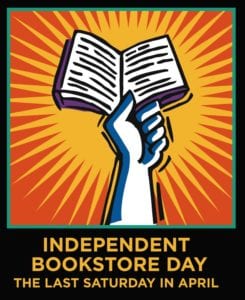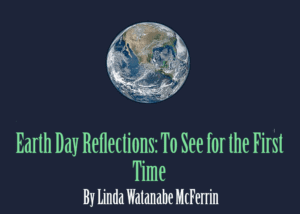Independent Bookstore Day: What do the Indies Offer?

Amid Amazon’s economic hegemony, amid the wholesale abandonment of big-box stores around the country, amid the strange, unpredicted resurgence of vinyl record collecting, and amid the general economic turmoil in the American printed news media we have, sitting in the room-corner upon a large leather chair, drinking tea, nose nestled cozily in the pages of Du Bois, the indie bookstore question. For what purpose does an indie bookstore exist in the age of digital media and online book sales?
This question might be rephrased to ask how an indie bookstore services the community. For, like the delicate mayfly who thrives only in clear, clean water, the independent bookstore is an indicator species for the financial and cultural health of a given community. Not only does the indie bookseller offer a plethora of free events like readings, book clubs, and workshops, but in two way it topples a barrier to culture often found in the large box stores and online marketplaces: curation and interaction.
The indie bookstore employee, much like the librarian, teacher, or publisher, is a specialized and impassioned position. The formal education of the bookstore employee exists simply in novel and poetry reading. If the countenance of the bookstore is a large spread of shelves and spines, then the soul surely exists in the employee who makes the facades meaningful through curation. Curation is more than segregation by genre and a small table for employee picks, it is more than barcode and dewey decimal, it is foundational to the bookstore itself and entirely humble.
There is a small bookstore in the northwestern part of Maryland run by three friends who also curate the collection. When I went in looking for a very specific book on Tocqueville the tallest took me to the shelves to look relaxedly at their section on the Americas while one of the shorter ones dug through a couple of crates in the back placing books by his knees, his torso entirely subsumed. When it turned out not to be in stock, I was aggravated at the time I felt was wasted, but also amenable to the three who had also spent that time with me only to come out without a sale. There was no computerized catalog, not even a paper archive, there were only books one had to dig through, to touch and be touched by, to smell the use and newness alternately and to feel how the pages of the old are rough and move like the skin of trees, heavy as a forest, and how the new are furbished, readable, and give the feeling of exploration. I was amenable, then, also, when one of the three said he might have some things up my alley and started picking from the shelves quite a few books, old, new, brown, green, and placing them into a small cardboard box. “Look through them” he said patiently, meaning I should take my time. In a nook in the corner was a raised shelf for lounging made homey by a few American-looking throw pillows. I took the books there and, without a care in the world slowly, daringly, impassioned, I discovered Sherwood Anderson. That day I left with two books: Winesburg, Ohio and The Triumph of the Egg neither of which addressed Tocqueville directly, but both, in narrative, wrangled with his most important ideas.
The indie bookstore employee is part scholar, part teacher, and part spiritual leader, for they operate as living curators of a selection of knowledge limited, by design and shelf-space, to books they have read and can recommend. It is okay, then, to come in without a specific book in mind—it is better even.
The curation I found and interaction I had at the store is not rare in the indie bookstore community. The bookstore provides an unpretentious place where books are not great or dumb, high brow or low brow, for there is no such dichotomy extant in the inventory. There are simply good books yearning to be read by any reader.
The latent unpretentiousness of the proper indie bookstore often flies in the face of one’s preconception. Where the popular glance sees a barrier to culture operated by faceless, often hipster seeming, elites, I, the local, see a welcome mat, dusty and amiable, laid at the front door for anyone to wipe away the grime of the street. In fact, it is those bookstores employing people who care nothing for books and curate into sections marked “classic” and “horror” and “fiction” which present a factitious barrier to culture. Not only do they house every book ever printed but they place restrictions on your sitting and reading them at your own pace; they appear more like a warehouse than a house with a soulless sort of dustlessness, smelling only faintly of paper and wood-cleaner; they surf their catalog and walk you about seeking a book they have not read (it is not their fault for there are more books there than a staff of 10 could read in their entire life). And when shopping Amazon online the soulless warehouse is not there shown on your computer screen, but surely the feeling is preserved. Many books offer only a 15 page preview, disallowing a classic aromatic flip-through. Many curate their own reviews dishonestly and lead you down a false path. With prime deals and day-sales online retailers practically beg you to buy and buy more. And it works. And indeed, such corporations offer nothing for the community. And when they purport to? When Amazon sets up a warehouse in the backyard of an economically disenfranchised area what do they offer but low wages and a patent sort of aloof, robotic cruelty?
The independent bookstore and the library are the last places in America to experience book-buying and book culture as it should be, free to experience, welcoming of all, curated finely, community focused, and, most importantly, an open and approachable archive for human culture.
On this Independent Bookstore Day, celebrate with us. ASP works to foster relationships with independent bookstores whenever we can through public readings, conversations, and our own shopping habits. As a small indie press, we will always work to elevate and celebrate the booksellers we love. As a result many of our titles exist at places like the larger "Politics and Prose" to the smaller "Happenstance Books and Yarns" in Lakefield, Canada. Thank the books gods for indie-bookstores.
Essays from ASP's Authors
Bastille Day
Professional author and Francophile, Joanna Biggar, breaks down the historical and philosophical significances of France’s most well-loved holiday, Bastille Day. Pour tous: Liberte! Egalite! Fraternite!
Earth Day Reflections: To See for the First Time
“Our communications are profuse and immediate, as is our consciousness of the interrelationship of all that exists. We’ve seen what we often leave in our wake—homeless populations, spoiled wilderness. We can see the way the decisions and investments that we make, here, everyday, can effect just how much milk a baby in Uganda gets. Our world is a teeming, mysterious, multi-cultural mousetrap of a place where everything seems to hinge on something else. We share a new concept of this planet as a finite space, dense, and more difficult than ever to navigate. We live in an environment fraught with hazard, and it is important to have good guides, guides with insight—those who tread softly.”
Fiddlin’ Around in Ireland
Nothing buoys the spirits like a walk along Grafton Street. Gray day or sunny, it’s bright with noise and laughter. Loud “hellos,” babies crying, neighborly gossip, rich brogues and lilting Irish airs float up onto the breeze. Our chosen course allowed for a stroll through St. Stephen’s Green. Sunlight dappled the leafy brakes. Inspired by the moment, Lawrence liberated his fiddle and sawed out a hornpipe. He was joined in his performance by a pair of amorous ducks.
On Grafton street we were immediately surrounded by music. A couple of 9 and 10-year-old boys, Donald Reagon and Paul O’Neill, were delighting passersby with smooth moves on the fiddle and concertina. College students with shaved heads played sitars. Old men played jazz. A guitarist somewhere was plucking out George Harrison tunes and singing, “Here comes the sun, little darlin’ here comes the sun.”
On that musical street there was only one poet—a threadbare character who, for a pound or a punt (Irish pound) or nothing at all, would recite a poem by a poet of one’s choosing. I selected Yeats and was honored with “The Fiddler of Dooney”:
“When I play on my fiddle in Dooney, Folk dance like a wave of the sea . . .”
